21 Opera Statistics to Know About The Browser in 2025
8 min. read
Updated on
Read our disclosure page to find out how can you help MSPoweruser sustain the editorial team Read more
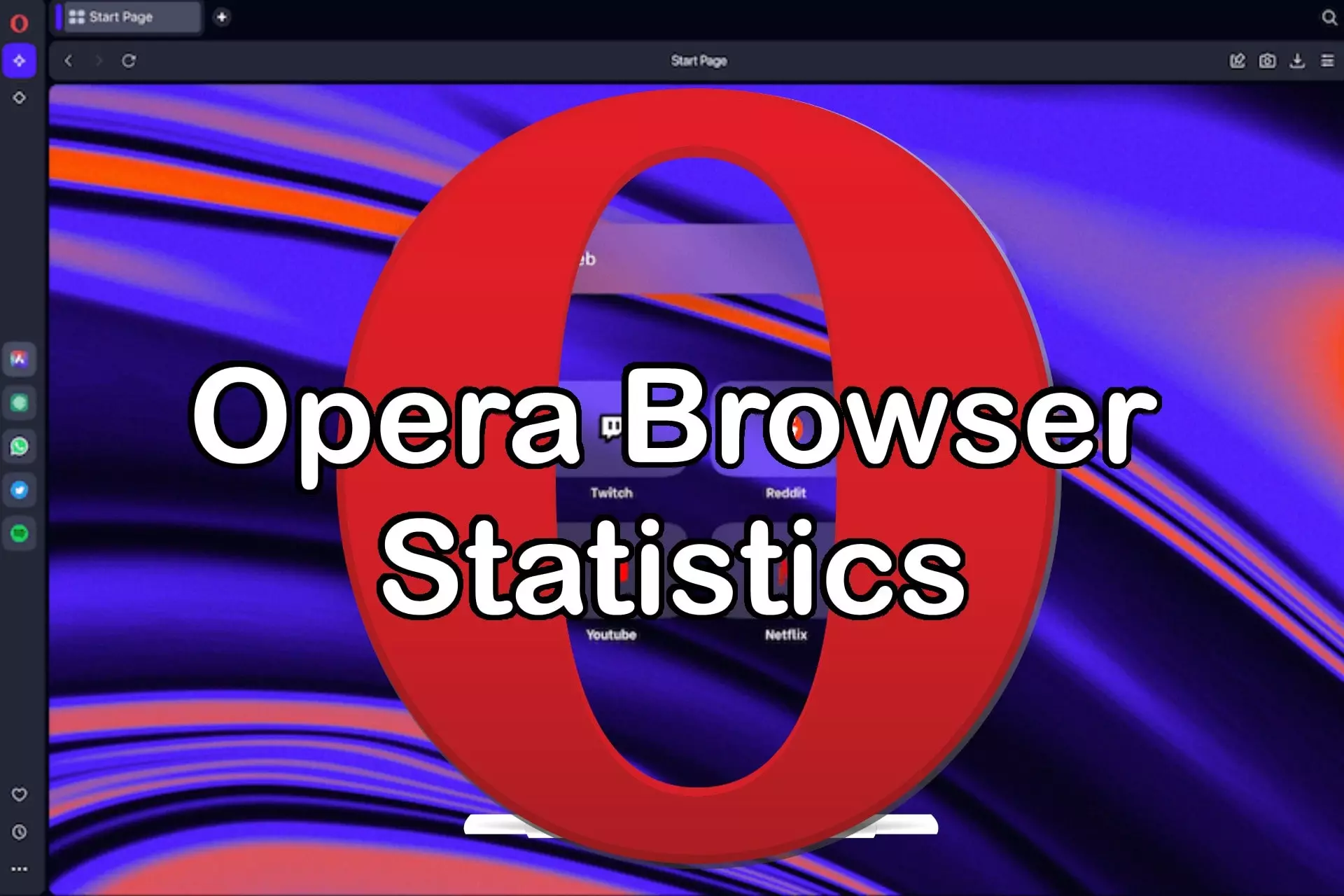
Initially released in 1995, Opera is one of the oldest and most successful web browsers in history. Despite fluctuations in popularity, it remains within the top 4 in the global browser market.
The following Opera statistics shed a fascinating light on its current market share, popularity across different platforms, history, and more.
Key Opera Statistics Everyone Should Know
If you want more insight into where Opera stands on the browser battleground and data you might not ever have considered, this is what everyone needs to know!
- Opera is the 4th most popular browser in the world.
- 350 million actively use Opera
- Opera’s most popular year was 2015.
- Opera was the first browser to introduce pop-up blocking and other features.
- In 2022 Opera recorded $331.5 million in revenue.
- Opera now includes AI assistant ARIA on Desktop and Mobile.
Opera Statistics and Market Share
How does Opera compare to other leading browsers and in which region is it most popular? These Opera stats take a deep dive into the web browser market.
1. Opera is the 4th most popular browser in the world.
(Source: StatCounter – Browser Market)
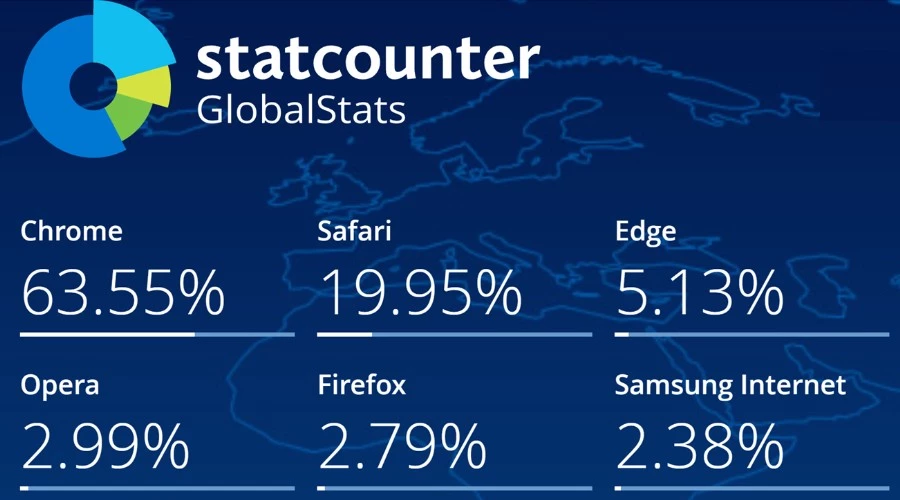
As of July 2023, Opera currently has a 2.99% share of the global web browser market, putting it in 4th place behind Edge at 5.13%, Safari at 19.95%, and Chrome at 63.55%.
Its closest rival is Firefox, which currently has 2.79% of the pie.
2. Opera has at least 350 million active users.
(Source: Opera About)
This market share means it has approximately 350 million active users across different operating systems and devices.
3. Opera is bigger in South America and Africa than in North America and Europe.
(Source: StatCounter – Browser Market)
As of July 2023, Opera takes the third spot in the web browser market in both Africa (9.95%) and South America (3.59%).
However, Opera is the least popular in Europe, taking the 6th spot with a 2.89% market share in that region. That even puts it behind the mobile-only browser Samsung Internet, which holds 3.55% of the market.
4. Firefox beats Opera on Desktop but Opera beats Firefox on Mobile.
(Sources: StatCounter Desktop, StatCounter Mobile)
When it comes to different devices, Firefox overtakes Opera with a 5.96% share of the global desktop browser market, compared to Opera’s 4.51%.
However, on mobile, Opera has the 4th spot with a 1.95% market share, compared to Firefox’s 0.5%.
5. A video downloader is Opera’s most popular extension.
(Source: Opera Extensions)
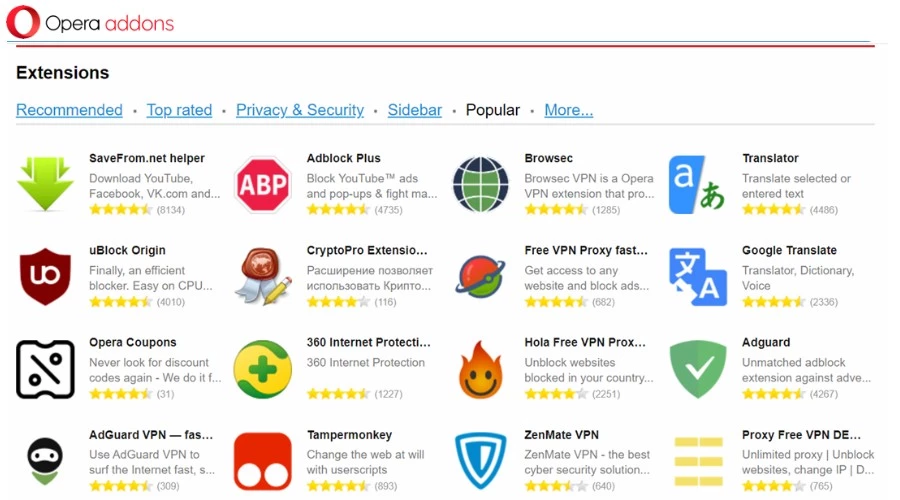
Based on current popularity, Opera’s most popular extension over the past month is SaveFrom, which lets users easily rip videos from YouTube and other sites. Unlike Chrome, which bans this feature, Opera freely allows the downloading of YouTube videos.
This is followed by Adblock Plus, Browsec VPN, and Translator, which quickly translates highlighted text within the browser.
6. Opera’s gaming browser GX has at least 20 million monthly average users.
(Source: Opera Investor)
As of 2022, Opera’s special gaming-focused browser, Opera GX, reported an average of 20 million users a month. This was up 11% from 18 million in the third quarter of 2022.
Financial Opera Statistics
The following Opera stats look at its revenue and other financial data.
7. In 2022 Opera recorded $331.5 million in revenue.
(Source: Opera Investor)
2022 was a big year for Opera financially, with revenues of $331.5 million. This was a 31.9% increase over 2021’s 250.9 million revenue figure.
8. In 2022 Opera made a net income of $15 million
(Source: Yahoo Finance)
As well as revenue of $331.5 million, 2022 saw Opera make a net income of $15 million, which was up significantly following a $43.1 million loss in 2021.
This surpassed estimates and marked several months of growth for the company into 2023.
9. Opera’s revenue increased by 21% in Q2 2023.
(Sources: PRNewswire, Yahoo Finance)
In an official release, Opera announced its revenue grew by 21% in the second quarter of 2023, to $94.1 million, over the same period in 2022. By the end of the year, the company predicts total revenue of $390 million.
This would be a $58.5 million increase from its 2022 final-year earnings of $331.5 million if its estimates prove accurate.
10. Opera has a market cap of $1.39 billion as of March, 2024.
(Source: CompaniesMarketCap)
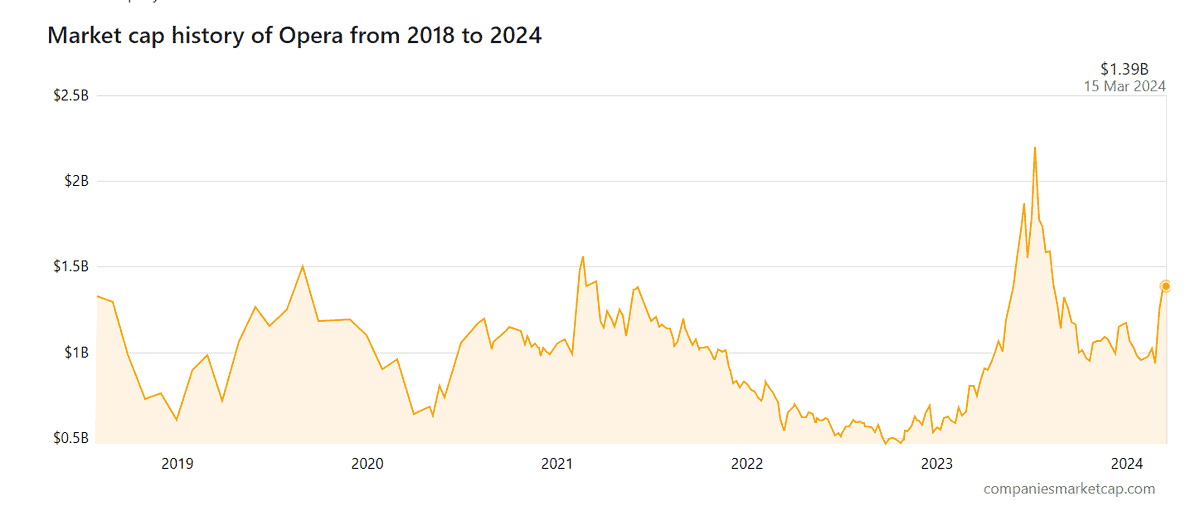
As of March, 2024, Opera has a net worth (market cap) of $1.39 billion. Despite some big fluctuations, its highest valuation over the past 5 years was July 03, 2023, when it peaked at 2.2 billion.
Its lowest day was October 17, 2022, when its market cap dropped to just 0.45 billion.
11. In Q4 2020, Opera saw over 100% year-over-year growth.
(Source: CompaniesMarketCap)
Over the past 5 years, Opera’s biggest financial growth increase was in the fourth quarter of 2020. This saw 111.11% YoY growth, which is compared to the same period the year prior.
This further quarter of 2019, saw a 64% YoY decrease.
Historical Opera Statistics
Opera came from humble beginnings and was one of the first web browsers to get significant support from the internet community of the day. Here are Opera’s milestones and famous facts across its timeline.
12. Opera traces its history back to 1995 and was publicly released in 1996.
(Source: Foxkeh)
Opera is one of the oldest web browsers that is still actively used and supported by its developers. Its initial beta release came in April 1995, followed by a full public release in 1996. Back then it was a Windows-only browser but went cross-platform in the year 2000.
13. Opera was ad-supported until 2005.
(Sources: The Register, Search Engine Journal)
In the early days of operating systems, many different revenue models were tested. To begin with, Opera was available for a free trial before users had to purchase a premium membership. Then in 2000, it switched to an ad-supported model.
Users would have to face these ads until 2005 when Opera went completely free. Instead, it got a kickback from Google for making it the default search engine within the browser.
14. Opera’s most popular year was 2015.
(Source: Statista – Browser Market)
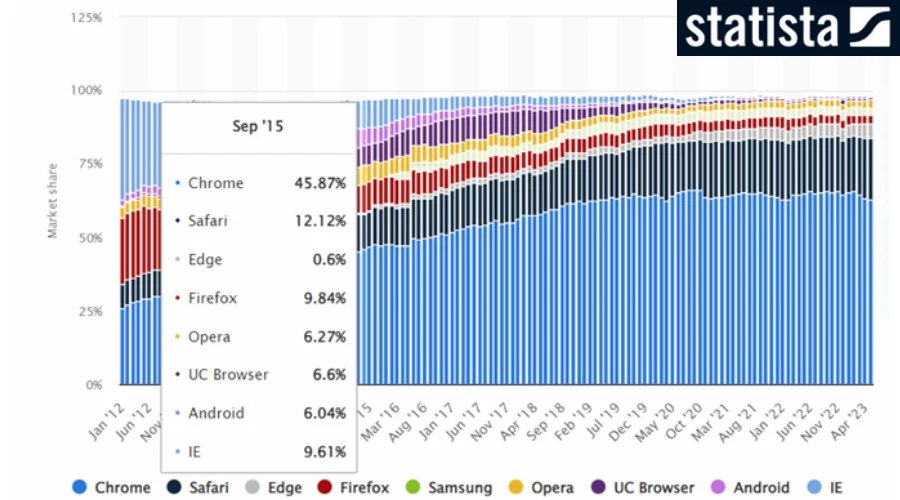
In terms of market share, Opera had its biggest year in 2015, peaking in September with a 6.27% share of the global browser market. At the same time, Firefox was much more successful, with 9.84% of the market.
15. Google users searched for Opera the most in 2004.
(Source: Google Trends)
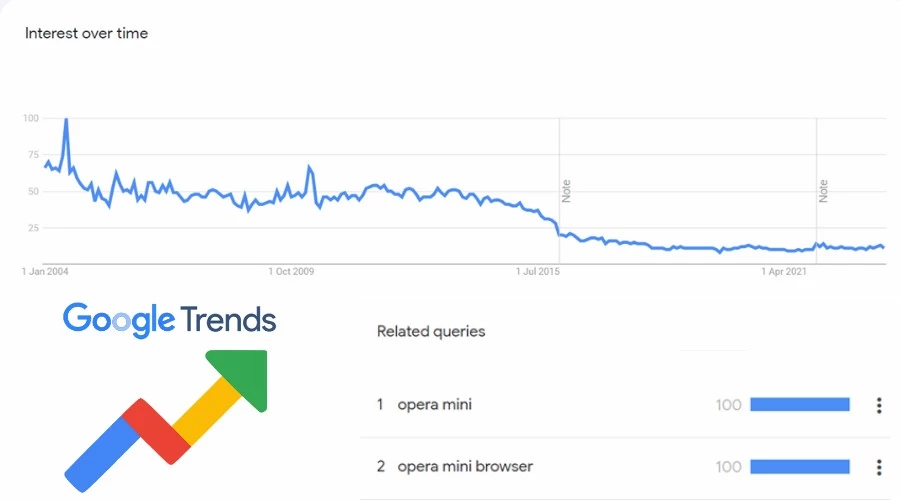
Based on worldwide Google Trends data, the biggest interest in the term Opera Browser was in July 2004. It has steadily declined since then. The most popular related query was Opera Mini, referencing the scaled-back mobile version of the browser.
16. Opera was the first browser to introduce pop-up blocking and other features.
(Source: SlashGeek)
Today we take certain features for granted, but many of them were pioneered by Opera.
Did you know Opera was the first browser to have built-in pop-up blocking? It also introduced tabs, quickly reopening closed pages, and even private browsing.
17. Today Opera has built-in support for crypto wallets and messaging apps.
(Sources: Engadget, TechCrunch, Opera)
Continuing its innovative streak, Opera has baked in support for several social media sites and messaging apps including TikTok, WhatsApp, Telegram, Facebook Messenger, Twitter, and Instagram.
It was also the first popular browser to introduce support for cryptocurrency wallets.
Opera Statistics for the Future
We know where Opera stands today and where it came from but what does the data say about its future? Here’s what’s recently been released and what you can expect in the coming months.
18. Opera now includes AI assistant Aria on Desktop and Mobile.
(Sources: Aria, The Verge)
Following in the footsteps of Microsoft Edge and its Bing Chat, Opera has now integrated an AI assistant into its desktop and mobile browsers, as of June 2023. Aria allows users to augment their web search by chatting to an AI bot, which is powered by ChatGPT.
As well as answering questions, Aria can generate content like emails, Tweets, and even blog posts, while making real-time use of the web.
19. Opera GX now wipes your browser history if you die.
(Source: PC Mag)
It’s a question that will become increasingly important as the years go on. What do we do about our digital footprint when we die? Opera’s special gaming browser Opera GX has solved a portion of that problem with its new Fake My History feature.
If you have not accessed the browser in two weeks, it automatically replaces your browsing history with fake and innocuous results.
Of course, it can also be used if you’re simply away from your computer and worried about snooping parents or partners.
20. An ASUS ROG edition of Opera GX is in the works.
(Source: Opera Blogs)
Opera GX recently joined forces with ASUS ROG (Republic of Gamers) to create a special version of the gaming browser, optimized for ROG products, including ASUS Aura integration.
21. Opera is forecasted to grow earnings and revenue by 1.2% and 13.7%
(Source: Simply Wall Street)
Opera is estimated to increase earnings and revenue by 1.2% and 13.7% per annum respectively. Furthermore, earnings per share (EPS) are forecast to grow by 4.6%. Within 3 years, investors can expect a return on equity of an estimated 10.6%.
Conclusion
As AI becomes more integrated with browsers and search, the road is unclear for the entire industry. However, these Opera statistics reveal that from desktop to mobile, there’s no doubt the browser has a loyal following and continues to adapt along the way.
Sources
- StatCounter – Browser Market
- Opera About
- StatCounter Desktop
- StatCounter Mobile
- Opera Extensions
- Opera Investor
- Yahoo Finance
- PRNewswire
- CompaniesMarketCap
- Foxkeh
- The Register
- Search Engine Journal
- Statista – Browser Market
- Google Trends
- SlashGeek
- Engadget
- TechCrunch
- Opera Software
- The Verge
- Aria
- PC Mag
- Opera Blogs
- Simply Wall Street








User forum
0 messages